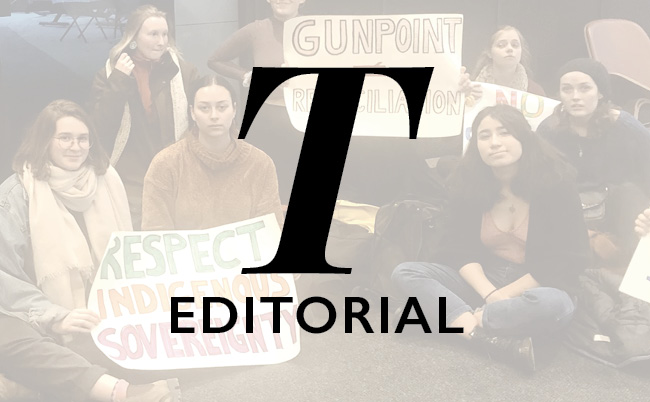As of press time, members of the Wet’suwet’en First Nation are struggling to defend their land: For over a decade, Coastal GasLink has been attempting to construct a natural gas pipeline through Wet’suwet’en territory, without the true consent of the Wet’suwet’en peoples. On Jan. 9, students at McGill hosted a demonstration at the Y-intersection to show of solidarity with the hereditary chiefs of the Wet’suwet’en, all five of whom unequivocally oppose the construction. Since then, the situation has only become more severe. In the last two weeks, the Royal Mounted Canadian Police (RCMP) have set up multiple checkpoints within Wet’suwet’en territory in order to prevent those defending their land from blocking construction. As of Feb. 7, the RCMP began to take military action, moving further into Wet’suwet’en territory with police vehicles, tactical gear, and arresting Indigenous people for defending their home. The members of the Wet’suwet’en First Nation are being persecuted, and for those of us who are settlers living, working, and going to school on land which belongs to Indigenous Kanienʼkehá꞉ka peoples, members of the McGill and Montreal community have a responsibility to offer aid and support land defenders.
Wet’suwet’en land is unceded territory: This means that the Canadian government does not have ownership over the land. Consequently, according to its own legislation, Canada has a responsibility to consult and negotiate with the Wet’suwet’en First Nation. The RCMP have justified their advancement on the territory with an injunction recently passed by a British Columbia (BC) court which ruled that Coastal GasLink could move forward with construction. However, since the land never belonged to Canada, the Canadian government should not have the power to forcibly remove Wet’suwet’en First Nation members from their territory.
The RCMP are enforcing a problematic provincial injunction on land which does not belong to Canada. The RCMP have stopped journalists from accessing demonstration sites. The Canadian government is continuing its well documented historical practice of engaging forcefully and unapologetically in targeted violence, oppression, and censorship of Indigenous peoples. Those in positions of privilege who observe, but fail to act in defiance of this contemporary colonization are complicit. This includes students who fail to speak up against injustices or show solidarity on campus and in the Montreal community.
The McGill protest on Jan. 9 can not be an isolated incident but rather should be the beginning of a larger, continuous movement to support the Indigenous community in Canada. Social media is a productive way to start. Sharing posts on Facebook, Instagram, or Twitter that call attention to the oppression of Indigenous communities can help educate and encourage more individuals to act. It is unfortunate that the Wet’suwet’en occupation only gained significant media attention after the situation became gravely dangerous. There is a discernible line between sharing a post which is informative and one which merely amounts to ‘trauma porn’ in that it exploits violence against Indigenous individuals to gain more clicks. Further, mobilization through social media must serve as merely the foundation of a more substantive exhibition of Indigenous solidarity.
One way non-Indigenous individuals can show solidarity is by donating money to the communities which are protecting Wet’suwet’en territory. Not only does this provide crucial resources to those protecting their homes, offering monetary contributions is one form of paying settler reparations. While not everyone is in a financial position to offer a significant donation to the Wet’suwet’en, even those who do not have money may have time to spare. This time is valuable in that it can be spent attending rallies, protests, and events organized by Indigenous community leaders. Finally, if members of the McGill community find themselves struggling to identify ways they can support the Wet’suwet’en, the First Nation has provided a ‘supporter toolkit’ online that outlines methods of resistance.
Individuals in positions of privilege should pursue the above types of action, not only at times when Indigenous communities are in crisis but on a consistent and continuous basis. In addition to being an Indigenous issue, the creation of this pipeline is an environmental issue. McGill also remains unapologetically invested in the fossil fuel industry and of companies that engage in pipeline projects like the one being forcefully implemented on Wet’suwet’en territory. The McGill Tribune attests that McGill University must divest, as a matter of both climate and Indigenous justice. On Feb.13, Divest McGill is holding a rally to support divestment from Coastal GasLink——as many McGill community members as possible should attend this rally. The persecution of Indigenous communities by the Canadian state through structures and institutions like the RCMP occurs every day. Indigenous solidarity must be a constant project in order to adequately address historic and ongoing oppression.
The Tribune’s Copy Editor, Keating Reid, dissented from this editorial.









